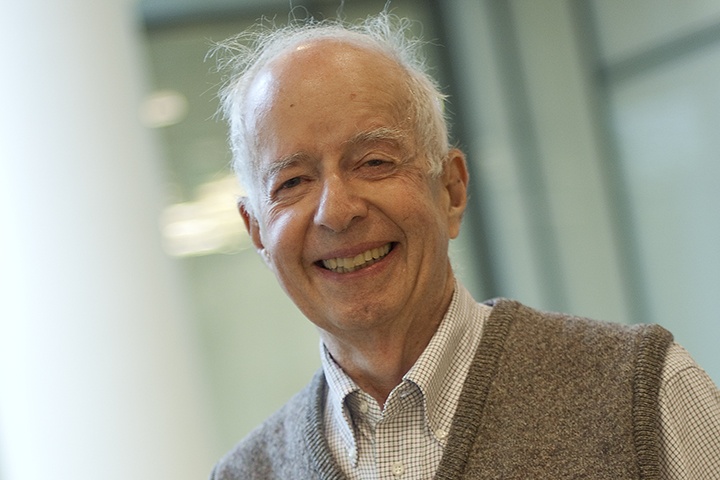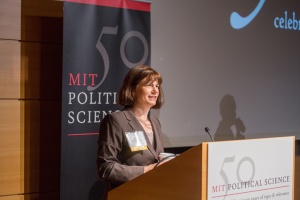ALUMNI SPOTLIGHT Professor Emeritus Eugene Skolnikoff, PhD '65: The circuitous path of an expert in Security Studies

Professor Emeritus Eugene Skolnikoff, PhD '65
Photo by Stuart Darsch
In November 2015, MIT's Department of Political Science celebrated its 50th anniversary, marking a half century of rigor and relevance. In tribute to our alumni who have made the department the successful and diverse community that it is today, the department is highlighting three alumni who joined us for the celebration. Eugene Skolnikoff, the first student to receive a PhD from MIT Political Science and later a longtime member of the faculty, exemplifies the department's unique strengths with his success in academia and industry. Here, he discusses his circuitous path to political science, the benefits of combining technical and social science training, and the maelstrom of public service in Washington.
Q. You began your unique career as a student of electrical engineering, serving as a Project Engineer for the U.S Army — among other impressive engineering posts — as well as a presidential science advisor. What prompted your shift from engineering to political science?
A. There is no simple answer, though as is often the case, accidental events were critical. I was “captured” by the humanities courses I took at MIT as an undergraduate in electrical engineering, but still assumed I would continue on a technically-oriented career, probably in industry. However, I was fortunate to win a Rhodes Scholarship, basically to continue to study physics for a D. Phil (PhD) at Oxford. By the time I got there some nine months later, I knew a career in scientific research was not for me. Instead, I wanted to learn what I missed: a deeper exposure to literature, economics and philosophy that was largely absent both in my high school and in MIT undergraduate life. But I still had the assumption I would return to a scientific/technical career one day. At Oxford I majored in their mixed major: politics, philosophy and economics, with my emphasis on the economics. The result was a clear shift in direction, though I had no clear idea at the time where I would end up. A year in the administration at MIT and two years in the Army Security Agency still didn’t provide clear direction, but then Sputnik in 1957 led President Eisenhower to set up the first Presidential Office of the Science Advisor in the White House. Jim Killian, then President of MIT, asked me to join his very small, but highly influential staff. I had to learn fast, and found I was fascinated and intrigued by the workings of government in general and, nearer at hand, how science and technology related to public policy.
Bob Wood, then head of the MIT political science section of the economics department (separated in 1965) was determined to start a specialty in science and public policy in the department and urged me to come to the Department. He was a determined recruiter, but by then (1963) I was already thinking of undertaking a more disciplined study of politics, in some sense to understand better what I had been doing avidly in government since 1958. That led me to a PhD in political science. In short, my sudden immersion in government in a high level post was the catalyst for a substantial career shift from engineering to political science.
Q. Our current and prospective students of political science will be curious to know: what value and perspectives can individuals with strong backgrounds in both technical fields such as engineering and science and in political science provide for public service positions? Can anything prepare you for Washington?
A. Science and technology pervade so many policy areas, sometimes centrally, sometimes peripherally, that there are few subjects for which S&T are completely irrelevant. In fact, the difficulty is that, except for questions that obviously turn only on technical facts, which is rare, S&T tend to be downplayed in the policy process (often out of ignorance or fear of science) in favor of political or other non-technical aspects. In any policy issue for which technical factors are relevant, they should be considered, but in a way that relates them to the other aspects of an issue, rarely as a stand-alone presentation. In short, a sound foundation in political science, built on a sound foundation in S&T, is excellent preparation for policy-making in many positions in government, and not only in Washington.
This is true even in many obviously technology-relevant policy areas, including security and foreign affairs, as it is in the relatively non-technical subjects of finance and public health. The questions, for example, surrounding nuclear weapons agreements with the Soviet Union in the 1960s involved obvious issues of how much nuclear material was necessary for a bomb, and evaluation of the intelligence capability to detect cheating, as well as political judgments of Soviet intentions and the deterrent aspects of any agreement. Ultimately, the partial nuclear test ban agreement with the Soviet Union was a product of a combination of many different issues, including of course domestic political questions, in which the strong commitment of the President to achieve a political agreement was decisive.
With regard to preparation for Washington, one can only say that experience in the maelstrom is one route, but it is not the only way. Government is not impervious to description and elaboration. In addition to discussing specific issues and highlighting the policy process, I would sometimes use role-playing as a device, and some schools rely on case studies. The department was at one time famous for designing and running “war games,” which could impart the flavor of the pressure of decision-making, though at the risk of fooling the participants into believing they had “seen” reality.
Q. As an expert in the fields of science and technology, you must have had some unique experiences during your White House stints. Of which particular policy initiatives under the Eisenhower, Kennedy, or Carter administrations are you most proud, and why?
A. Since I was a staff member in the Office of the Science Adviser (OST later) under Eisenhower and Kennedy, most of my activities were on issues initiated by the President, the President’s Science Advisory Committee (PSAC) or by the individual who was the President’s Science Advisor and head of the office. In the early years, the staff was very small — five or six at the start — so there was considerable sharing of tasks and subjects. I was involved to some extent in the nuclear test ban negotiations, in the creation of NASA, and in the early studies of education and basic science support in the United States.
My largest single effort for which I had particular responsibility was the creation of an R&D program in the writing of the Foreign Assistance Act that created the Agency for International Development (AID). It was intended as a substantial program that would focus on science and development issues associated with the economic growth of developing countries, including engineering and social science. We were successful in the face of determined congressional opposition that was largely due to the unpopularity of foreign aid and equally of social science research.
